|
A chronology of key events:
1600s - Portuguese invade Timor, set up trading post and use island as source of sandalwood.
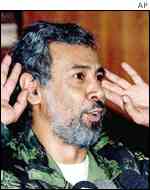
Long-term freedom fighter Xanana Gusmao
|
1749 - Timor split following battle between Portuguese and Dutch. Portuguese take the eastern half.
1942 - Japanese invade, fighting battles with
Australian troops. Up to 60,000 East Timorese are killed. Japan in
control until 1945.
1974 - Anti-Fascist revolution in Portugal leads to promise to free colonies, encouraging parties to prepare for new future.
1975 August - Portuguese administration withdraws to offshore island of Atauro.
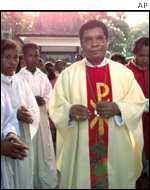
Unifying force: Nobel laureate Bishop Belo
|
1975 October - Five foreign journalists killed along border with West Timor, allegedly by Indonesian troops.
1975 November - After brief civil war, Fretilin
(Revolutionary Front for an Independent East Timor) declares East Timor
independent.
1975 December - Indonesia invades, using its fight
against communism as a pretext. It annexes territory as its 27th
province, a move not recognised by the UN.
Strong resistance to Indonesian rule followed by repression and famine in which 200,000 people are thought to have died.
1991 - Santa Cruz cemetery massacre in which
troops fire on mourners at a funeral in Dili of Fretilin supporter,
killing more than 100 people.
1992 - Setback for the resistance as
pro-independence leader Xanana Gusmao is captured near Dili. In 1993 he
is convicted of subversion and is given a life sentence which is later
reduced.
1993 - Groups of East Timorese enter foreign embassies in Jakarta over the next few years seeking political asylum.

Nobel laureate Ramos-Horta is welcomed home in 1999 after 25 years away
|
1995 - 20th anniversary of the Indonesian
invasion marked by protest by 112 East Timorese and sympathisers who
enter Russian and Dutch embassies in Jakarta.
1996 - Acting Bishop of Dili, Carlos Belo, and
resistance leader Jose Ramos Horta jointly awarded Nobel Peace Prize,
raising international awareness of the East Timorese independence
struggle.
1998 - Indonesian President Suharto resigns.
Replaced by Habibie who suggests territory may be given special status
within Indonesia.
1999 January - Indonesia says it will consider independence for East Timor if people reject autonomy.
Build-up to referendum
1999 February-April - Gusmao moved from Jakarta
prison to house arrest. In response to increasing violence by
anti-independence activists, Gusmao orders guerrillas to resume
independence struggle.
1999 May - Indonesia, Portugal sign agreement to allow East Timorese to vote on their future. Deal endorsed by UN.
1999 August 30 - Almost 99% of 450,000-strong electorate votes in UN-organised referendum.
1999 September - Result of referendum shows 78 % voters favoured independence.
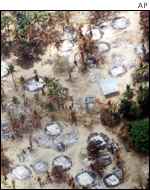
Referendum revenge: Aerial view of village turned to ashes by militia
|
Violence erupts as anti-independence militia helped by
the Indonesian military resume campaign of terror, leaving up to 1,000
dead. A quarter of the population flees, mainly to West Timor. Martial
law imposed. Gusmao freed.
Australian-led peace-keeping force arrives, gradually
restores order. Many militia members flee to West Timor to avoid
arrest. Indonesian parliament recognises outcome of referendum.
1999 October - Gusmao released. UN Transitional Administration in East Timor (UNTAET) established.
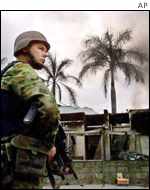
Restoring order: Australian peacekeeper on patrol as Dili burns
|
1999 December - International donors at a Tokyo conference agree to provide US $520 million in aid to help rebuild East Timor.
2000 September - United Nations evacuates staff
from West Timor following series of incidents culminating in the murder
of three UN refugee agency workers by pro-Indonesian militia gangs in
Atambua. Tens of thousands of refugees are left without international
assistance. An Indonesian court subsequently jails six men for up to 20
months for the killings, earning international outrage for being too
lenient.
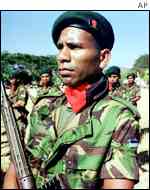
Anniversary: FALINTIL troops on parade at the 25th anniversary of their guerrilla army
|
2001 - East Timor, Australia sign a deal to
give East Timor a greater share of future revenues from oil and gas
fields in the Timor Sea than under an earlier Australian-Indonesian
agreement. East Timor is to get 90% of the revenue which should amount
to billions of dollars over the next 20 years.
2001 August - Election of 88-member Constituent
Assembly, which is to write constitution for independent East Timor.
Fretilin party wins, taking 55 seats.
2002 - January - Truth and reconciliation commission opens to try and heal wounds of past.
2002 January - Indonesia inaugurates human rights court which is
expected to test government's willingness to hold the military
accountable for atrocities in East Timor after the territory's
independence vote in 1999.
2002 February - East Timor's assembly approves draft constitution envisaging a government run along parliamentary lines.
2002 February - East Timor and Indonesia sign two agreements aimed at easing relations.
2002 April - Xanana Gusmao wins presidential elections.
2002 17 May - UN Security Council votes for new peacekeeping mission to replace the UN transitional administration at independence.
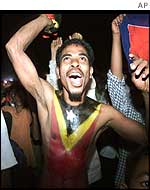
A nation is born: mass celebrations marked East Timor's independence
|
2002 20 May - Independence: VIP guests including former US
president Bill Clinton and Indonesian President Megawati Sukarnoputri
join the celebrations in Dili.
2002 September - East Timor becomes the 191st member of the United Nations.
2002 November - Indonesian human rights tribunal
convicts former pro-Jakarta militia leader Eurico Guterres of crimes
against humanity for his part in 1999 massacre. The sentence is the
heaviest handed down so far by the tribunal, which has been widely
criticised for its reluctance to convict those charged.
2003 March - Court in Jakarta sentences
Indonesia's former military chief in East Timor, Brigadier General Noer
Muis, to five years in jail for crimes against humanity. He is accused
of failing to prevent attacks on civilians which followed the 1999
independence vote.
|